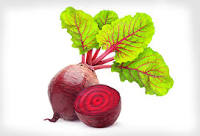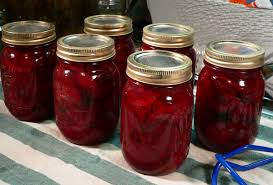Fresh beets are great nutritious food with many health benefits. They are low in fat, full of antioxidants and packed with vitamins and minerals. Pickling preserves the beets for a considerable time period, making beets available even when they are out of season. But you may wonder whether pickled beets still have so many benefits.
Are Pickled Beets Good for You?

The answer is yes. Pickled beets are an excellent healthy food. The process of pickling can preserve the majority of the nutritional values of beets. Pickled beets are good for you as they have a high fiber content, and are rich in vitamins and minerals. Here are the explanations of why pickled beets are good for you.
1. Low in Fat
Beets are extremely low in fat, with less than 0.2g of fat per cup of pickled beets. Therefore, pickled beets, combined with low-calorie diet, may help you to control your weight. Saturated fats and trans-fats are associated with heart disease, but pickled beets do not contain any of these worrying fats.
2. Rich in Carbohydrates
Carbohydrates are important as they act as your body's fuel source. So if you want to get some power, pickled beets are a great choice. One cup of pickled beets provides around 37g of carbohydrates. Carbohydrates are also a great addition to any post-workout meal.
3. Rich in Dietary Fiber
One cup of pickled beets contains around 6 g of dietary fiber. Fiber is important for a number of reasons, including encouraging digestive health, providing feelings of fullness and maintaining your blood sugar levels.
4. High in Potassium
Are pickled beets good for you? Yes, active people will benefit from the rich potassium content in pickled beets. Potassium facilitates electrical transmissions throughout your body. When you sweat, you lose potassium, which can cause weakness, low energy, palpitations, and cramps. Pickled beets can replenish your potassium loss immediately.
5. Good Source of Magnesium
A deficit in magnesium can cause low energy, tiredness, and poor appetite. You can treat this condition by eating pickled beets. Pickled beets are high in magnesium, which helps to maintain proper function of the nerve, the immune system, and the heart.
6. High in Vitamin A
Pickled beets have a high vitamin A content. Vitamin A is vital for the health of your eyes, mucus membranes, skin, and teeth.
7. Detox Capabilities
Pickled beets can help regulate liver function, as they can help your body to flush toxins out. When liver is trying to detoxify substances, pickled beets can work as catalysts. There is some evidence that pickled beets may also be helpful to treat anemia, as they help to cleanse the blood and produce more red blood cells.
8. Mental Health Benefits
Are pickled beets good for your mental health? Yes, they contain high levels of tryptophan which helps keep you relaxed and stay calm. They also contain betaine which is a substance used in anti-depressants.
9. Other Benefits
- Pickled beets have anti-inflammatory properties.
- Betalains that give pickled beets the red color are an effective antioxidant which has been shown to slow tumor formation.
- They also contain lutein and zeaxanthin which are helpful in the treatment of muscular degeneration.
Note: It is important to consume pickled beets in moderate quantities. Just one cup will usually contain a third of your daily allowance of salt. Too many pickled beets may bring you risks of increased blood pressure and cardiovascular disease. If you eat pickled beets, it is wise to avoid other high sodium foods.
How to Make Pickled Beets at Home

Are pickled beets good for you? Now you know the answer and may want to make your own beets at home. Here is what to do.
1. Select Beets
When selecting beets to pickle, try to find baby beets that are less than 3 inches wide. If you use bigger beets, it’s likely that they will carry an earthy taste which won’t be masked by the pickling vinegar. Although there are lots of red beets around, if you like, you can also pickle yellow or candy-striped varieties. You could try mixing different varieties if you would like to create a jar with great visual impact.
2. Choose Spices
It is important to choose your herbs and spices carefully, as they don’t just add to the flavor, but they also help to prevent organisms from developing in the jars. Try to find spices with natural antimicrobial properties, such as bay, allspice, sage, rosemary, caraway seeds, thyme, coriander and garlic.
3. Prepare
- You need to trim the beets to around ½ inch, and then use cool water to clean them.
- Once this is done, you will need to simmer the beets for around 30 minutes before draining the water and plunging them into cold water to let them cool.
- After this, slide off the skins of beets, and slice them into ¼ inch discs.
- Place the beets into a canning jar (make sure it’s clean and sterilized), leaving about 1 ½ inches of space at the top of the jar.
4. Pickle
Using a 4-2-1 ratio of vinegar to water to sugar, to create your pickle brine. This will help to ensure that your pickled beets have enough acidity to prevent bacterial growth.
Any vinegar is suitable for pickling beets, so choose the one you really enjoy. Put your vinegar, spices, and sugar into a pan and bring to the boil. Following this, remove the pan from the heat and pour over your beets. Once they’ve cooled, put them in the fridge for around 7 days to allow their flavor to develop. They can be stored in the fridge for up to 3 months. If you want to keep them longer, put these jars in boiling water before putting them in the fridge.
You can watch the video if you want more instructions on how to pickle beets.
